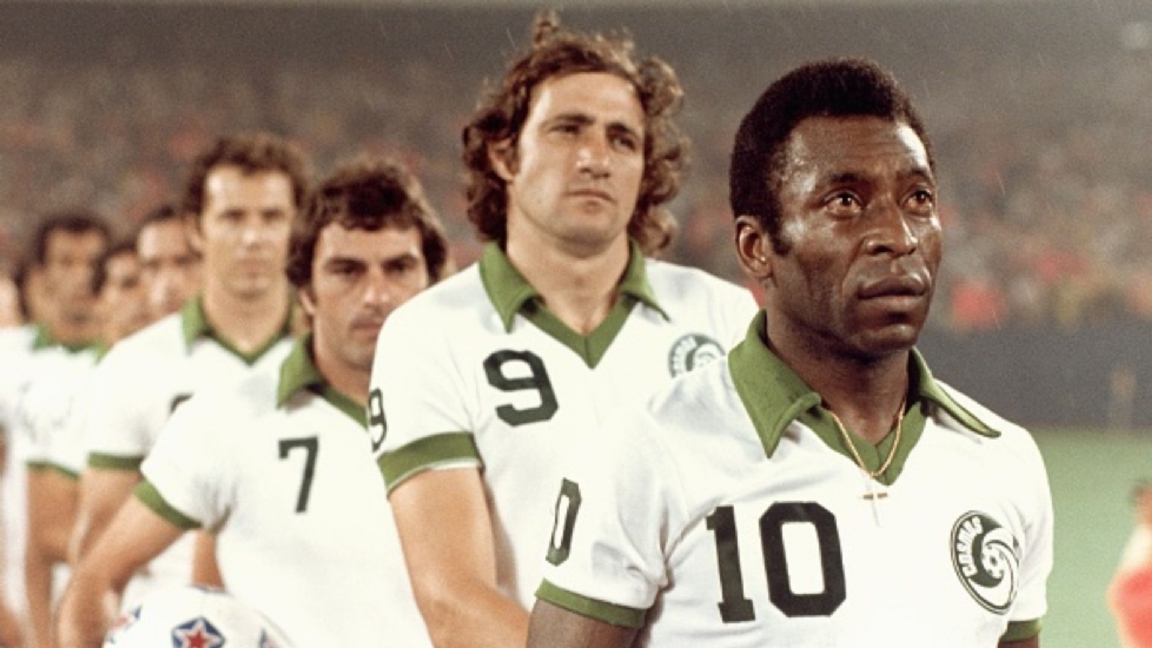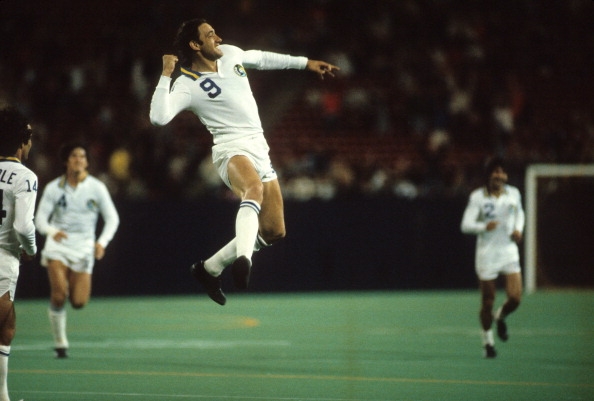![]()

The rich football history has many striking, tragic or funny characters. In the Vedettes section, Voetbalzone always highlights the baptismal plot of one of those figures. Today the story of the Italian striker who was sent away by Swansea Town and subsequently became a legend at Lazio Roma.
By Sander Grasman
Furious, the player in the white away shirt of the Azzurri stalks off the field. He makes a few more dismissive gestures towards the couch before saying a heartfelt message Vaffanculo! disappears into the catacombs of the stadium. This match against Haiti at the 1974 World Cup will not be Giorgio Chinaglia’s last international match, but it may indirectly lead to his departure from European football.
When the Haitians take the lead in the first half, the thoughts of all Italians on the field and at home in front of the TV immediately go back to that historic defeat eight years earlier, when the team saw a place in the quarter-finals slip through their fingers due to an unanswered goal by North Korean Pak Doo-Ik. Such a scenario must now be prevented at all costs in Germany and after a few missed opportunities, national coach Ferruccio Valcareggi has seen enough of Chinaglia half an hour later and replaces him for another striker, Pietro Anastasi.
The Lazio attacker, who was his club’s first a few weeks earlier scudetto the club’s history and became Serie A’s top scorer, is not happy about it to say the least and lets his frustrations flow. The fact that Anastasi eventually scores the 3-1 ensures that the tirade of the substituted Chinaglia in his own country is met with even more derision from the tifosi can count. If the Italians ultimately fall in the group stage due to a draw against Argentina and a defeat against the strong Poland, the scapegoat is quickly found.
The stepped scene is illustrative of the striker who divides opinions like no other. ‘You either hate him or you love him’ is an often used way to describe someone, but not often as apt as in the case of Giorgio Chinaglia. With him there is no middle ground. The former Lazio striker is adored by the blue part of the city, while almost all other supporters in the country can drink his blood. He is aggressive, mean, clumsy and arrogant, but also a goal scorer par excellence.
That talent does not yet emerge when he starts playing football in Wales, the country to which his parents emigrated in search of economic prosperity and where eight-year-old Giorgio also ends up a few years later. At Swansea Town they send him away after just six games and his career seems to be over before it even gets started. Chinaglia returns to Italy to do his military service and will play for Massese, a club near his hometown of Carrara.
Maybe Italian football just suits him better, because here he is valued almost immediately. He forced a transfer to Internapoli and three seasons later he was playing in Serie A when Lazio picked him up for two hundred million lire from Naples’ second club. It is the beginning of a mutual love that initially gets off to a slow start.
In his second season in the capital, Lazio is relegated, but the club is doing well, because the new coach Tommaso Maestrelli, a former player of arch-enemy Roma, knows how to create a well-coordinated football machine from the ragtag mess and for He is like a second father to Chinaglia. Lazio are immediately promoted back to Serie A and immediately compete for the top places. Chinaglia is worth gold to the club with his goals and he is becoming an idolized crowd favorite.
The Lazio of the 1970s is a remarkable company. They are outspoken supporters of fascism, tough on opponents and each other and are almost all fond of firearms. During training camps, people shoot at lampposts, birds, each other and sometimes also at annoying Roma supporters. The tireless midfielder Luciano Re Cecconi is an exception to this rule and that makes what would happen to him all the more tragic.
Together with teammate Pietro Ghedin and another friend, Re Cecconi walked into a jewelry store on a drizzly January day. He jokingly shouted that they were coming to rob the store. Before he knew it, the jeweler had pointed a gun at his chest and pulled the trigger. The bullet pierced the heart the Blonde Angel, as Re Cecconi’s nickname was. He was dead before emergency services arrived on the scene.
They were in Italy gli anni di piombo, the years of lead. Extreme left and extreme right groups committed massive attacks and financed their terrorism with robberies. The jeweler where the Lazio player died had not long before been the victim of an armed robbery and so the man behind the counter was on alert. “It was just a joke,” were Re Cecconi’s last words.
Shortly before his midfielder, coach Maestrelli had also passed away. He was diagnosed with advanced colon cancer in 1975 and was dead a year later. His successor was clearly less tolerant of the fickle character of his striker, who of course also missed his teacher and was quick to take his chances. Chinaglia’s wife, whom he had met during his time in Naples and was the daughter of an American soldier stationed in that southern Italian city, wanted to return to her homeland and Chinaglia, whose clothing store had been vandalized by Roma supporters and who had always walked through the city with a weapon in his pocket, was also interested in that.
Re Cecconi y Maestrelli. Lazio. 70’s. pic.twitter.com/59AFjaJGBk
— Nostalgia Futbolera ® (@nostalgiafutbo1) April 11, 2022
The NASL, the North American Soccer League, had already managed to attract several big stars to North America in those years, but those players were usually long gone. That certainly did not apply to the 29-year-old Chinaglia. The Italian still had a number of productive seasons ahead of him and took full advantage of his less talented or worn-out opponents. He scored like crazy, scoring 241 goals in 252 games and in six of the striker’s eight seasons in the NASL he became the top scorer in that competition.
“If Chinaglia shoots from somewhere, he does it because he thinks Chinaglia can score from there.” Chinaglia is said to have shouted that in the locker room when a New York Cosmos teammate accused him of going for his own success too often. In itself there is something to be said about that statement, but if you consider that that irritated teammate was none other than Pelé, a player with more than a thousand goals to his name and who knew a thing or two about scoring goals. goals, that statement becomes completely ridiculous. The two played together in New York, where the Brazilian often acted as a pointer for Chinaglia, but the Italian still felt that o Rei got in his way too often.
While Chinaglia is growing into a star in New York, things are going a lot less well at Lazio. After a gambling scandal, the club is demoted to Serie B and several players are banned from the sport for years. Chinaglia decides to use a large part of his own money to buy the club. However, he appears to have less talent for governing than for scoring goals. Moreover, he came into controversy when he attacked a referee with an umbrella after he had awarded a questionable penalty to the opponent. Ultimately, his presidency comes to an end when he is charged with mismanagement and fraud.

A cheering Chinaglia in the New York Cosmos uniform.
In 2005, the prodigal son returns to Rome one last time. He claims he can buy out chairman Claudio Lotito with the help of a Hungarian lender. The latter sidelined the ultras in previous years and they hope to get a foot in the door again through Chinaglia. In addition to interference from the hooligans, investigation shows that money from the Casalesi, a Camorra clan from Naples, was involved in the takeover attempt and the Italian justice department issued several arrest warrants, including one for the former striker.
Chinaglia avoids prosecution, because by then he has already been in America for a long time. He will never see his homeland again, because he died in 2012 after a heart attack, at the age of 65 and twelve years after he was voted the best player in club history by the Lazio supporters. The Laziali were and are far from forgotten about their old hero.
On the 12th May 1974, 47 years ago today, Lazio beat Foggia 1-0 to secure their first ever Scudetto. The game was won thanks to a penalty scored by talismanic figure Giorgio Chinaglia. A historical and memorable moment for Lazio. ????????? pic.twitter.com/WlNl89usMO
— Jerry Mancini (@jmancini8) May 12, 2021